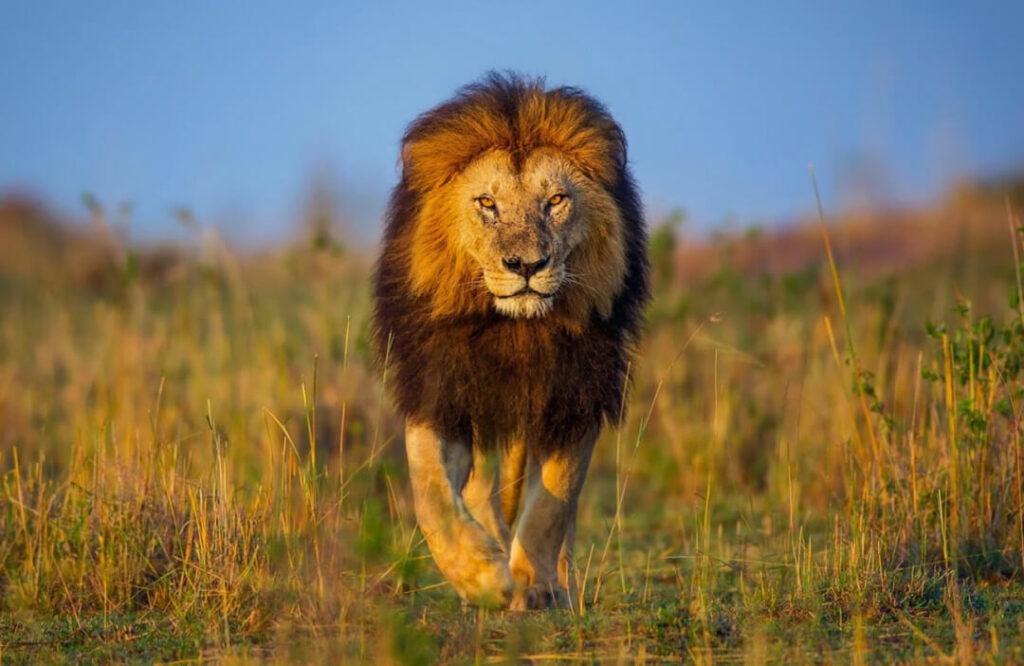Hunting Lion in Africa: A Big Game Hunting Safari At Its Best!
As the sun sets over the African horizon, clear skies transform into a world of dark shadows, danger, and mystery. Visibility is limited as the darkness engulfs the day, shutting off the light that provides comfort to the daylight dwellers.
The African savannah and woodlands are transformed into a world of fear those not suitably armed to take on the predators that lurk in the gloom. A new world awakens and the African Lion, the mighty King of the Jungle seizes the power of the night.
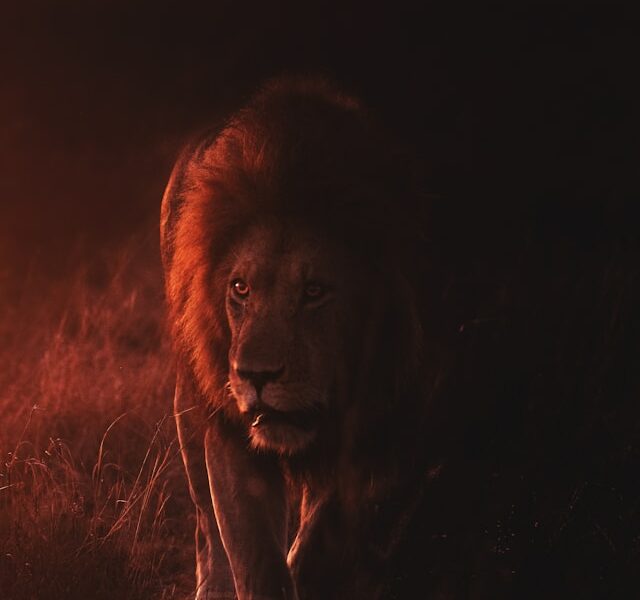
[DYNAMIC-BLOGTABLEOFCONTENT]
The African Lion: The Most Feared of the African Big Five
African Lions are more than suitably armed to destroy any prey that is set to become the lion’s bloody feast. While hunting lion in Africa, the hunter may have met his match when it comes to this apex predator. Armed with razor-sharp teeth, retractable claws, and powerful jaws, the African lion is always ready for battle.
Lions are known to bring down prey that are much larger than themselves. Powerful muscles and quick reflexes result in a quick death for the unmatched opponent.
When on an African safari hunting trip and hunting lions in Africa, the hunter had better be well-armed and suitably prepared. This mighty predator shows no remorse for who or what he chews, bites, and consumes.
Weighing in at four hundred pounds, it is not surprising that nature’s perfect killing machine has always been a symbol of courage and strength.
Are you ready to hunt lions in Africa?
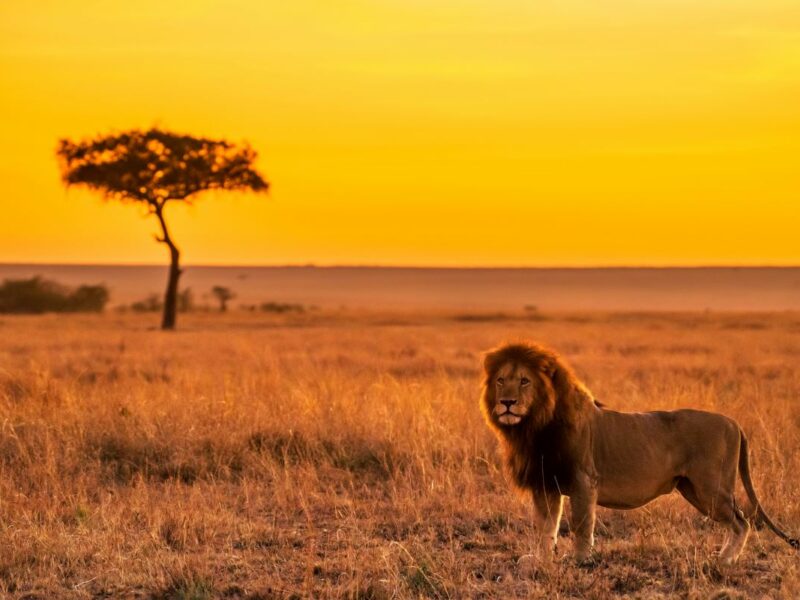
Can you go Lion Hunting in Africa?
Yes, lion hunting is available and both males and females can be hunted on any African safari hunting trip.
What Destination for Hunting Lion is most suitable for a Game Hunting Safari?
Popular destinations for lion hunting in Africa include:
- Mozambique
- Tanzania
- Namibia
- Zimbabwe
- Zambia
- South Africa
When it comes to hunting lions in South Africa, this method of captive-bred lion hunting will be discussed in detail further. At present, ethical concerns have been raised by anti-hunting groups and emotions run high when discussions turn to hunting lions in South Africa.
Hunting Lodges in Africa
When considering a big game hunting safari in Africa, questions are often raised by visitors such as:
- On my game hunting safari, where will we sleep? On the floor?
- Will the linen be clean and washed?
- Will we be safe and protected at night from the dangerous game predators?
- Will the food be edible and nutritional?
The only real questions I have when booking a game hunting safari are: Will there be ice and will the beer be cold?
The reality is that game lodges in Africa are five-star and are geared for international big game hunters. We also need to take cognizance of the fact that when on a lion hunting safari, and pursuing dangerous game in the wild, we do go to some remote destinations on the dark continent.
Game lodges in Africa will cater to all the big game hunters needs and there should not be any concerns when booking an Africa safari hunting trip. There is always hot and running water, and flushing toilets and the local meals are outstanding. When game hunting in remote areas, due to a lack of government-provided electricity, there is often no air-conditioning, and cell reception can be a problem in certain areas.
How much does an African Hunt Cost?
The price of hunting lions in Africa varies between countries. The cost variations are due to logistics, location, trophy fees, and the need for additional domestic travel. In some African countries lion hunting safari prices vary as the local Government stipulates the length of the hunting safari and then the cost of additional day fees is brought into account.
The chart below indicates average lion hunting costs in Africa.
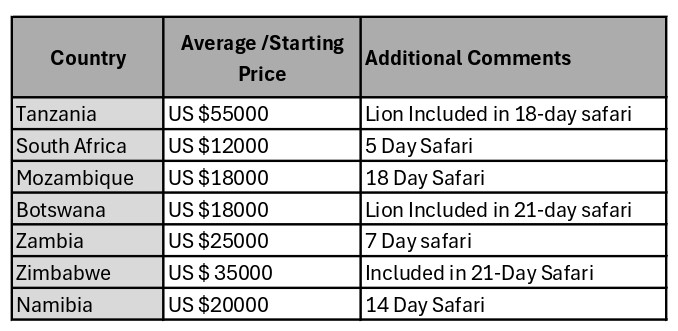

Shot Placement when Lion Hunting in Africa
- Once the game hunting safari is booked and paid for, preparation needs to start weeks before the hunting safari commences.
- Lions are exceptionally dangerous. We have all seen the videos doing the rounds on YouTube and social media where the lion charges, jumps on hunters, and attempts to maul them to death. Shots are fired all over the place. The biggest risk while hunting lions in Africa is often to avoid being shot by someone else on the hunting safari, forget the lion.
- The importance of shot placement while lion hunting cannot be underestimated and extensive research into studying the lion’s anatomy, the position of the heart and lungs, etc. is critical.
- The aim of all ethical lion hunters while big game hunting is to quickly and with one well-placed shot humanely kill the lion. Lions however do not always give the big game hunter the “perfect shot.” Lions tend to lay around or stretch or move and shift in such a manner that the heart changes position within the chest cavity.
- The lion frontal heart and lung shot: This shot may be recommended by your professional hunter. If the lion is facing towards you, shoot the lion in the center of the chest. The bullet will traverse into the vital organs and expire the lion. Do not shoot too low or too high.
- The lion frontal brain shot: This shot will not be recommended by your professional hunter as a first shot. This shot will only be taken when the lion is in full charge of a member of the hunting safari. This frontal brain shot may be the only shot available when the lion is charging and needs to be taken with a high-caliber rifle with sufficient stopping power.
- A frontal brain shot will also result in the lion trophy being ruined. The skull of a lion is soft and the hydrostatic shock created by the bullet will so serious damage.
- The lion broadside shot: This is the shot that your professional hunter will encourage the hunter to take. With the lion standing broadside, the heart and lungs will present a larger target area, bigger than the brain.
- A lion is not an ungulate which means that the heart will sit slightly back in the chest cavity. When aiming at the lion, use the same formula as when plains game hunting. Aim a third up the front leg and place the bullet just behind the shoulder joint.
Rifle Caliber and Ammunition
The minimal legal requirement in many African countries is a .375 loaded with a bullet not weighing less than three hundred grains. The lion is classified as a “soft animal.” The hunter will need to load with soft expanding bullets doing maximum internal damage.
So, the game hunting safari is in full force, hunters have arrived and the dream of hunting lion in Africa is now a reality.
Method of Baiting
Except in South Africa with the so-called “canned lion hunting,” baits are set up relatively low to the ground and in numerous places throughout the hunting area. The baits are just low enough for an adult lion to reach, but not low enough for the hyena to consume.
Intestines, blood, and guts from the bait animals will be spread around hoping to draw these big predators in. When preparing the readily available bait animals are used such as zebra, plains game animals, and in some instances even donkeys.
Daily these baits will be checked and if there is a big “hit” on a specific bait, a temporary blind will be built. The size of the spoor will indicate the size and age of the lion. Hunting lions under the estimated age of six years old may not be hunted.
The hunters will then wait in the blind from early afternoon and hopefully, the target lion will reappear
The Stalk
Another favorite method of hunting lion in Africa is the walk and stalk. The hunting safari will take up the spoor found at the baited area and follow the tracks until they meet up with the quarry. Hunting a lion on foot through dense vegetation and scrub most certainly has the makings of an adrenaline-packed game hunting safari.
Lions after feeding do not wander off the far from the bait. Lions can consume an enormous amount of meat in a single feed and are lazy animals.
Once the hunting safari is on the tracks of the lion, be sure to know that the lion will be fully aware of your presence. Under pressure, the lion will not walk away in a straight line. A circle or figure eight pattern will be followed. This means that while the big game hunters’ heads are to the ground following fresh spoor, the lion may be approaching from the side or the rear. Lions are highly intelligent, and this situation is extremely dangerous. High alert status would be the name of the game.
The point to ponder at this point of the lion hunt is, who is hunting who?
Once the lion is spotted, the lion will do one of two things:
- The lion will either turn and face the hunting party or take up the challenge presented.
- The lion will run off only to be tracked again.
After a few encounters with the hunters, the lion beds down and waits. This is where the action starts and where the lion is most dangerous.
Hunting Lion in South Africa
South Africa in recent years has made international headlines with regards to captive-bred lion hunting. This method of hunting lion in South Africa is also known as “canned lion hunting.”
Lions are raised in captivity, especially to be hunted. When the lions have reached the age of maturity, the lions are released into fenced-off ranches ranging in size from 4,000 acres to 20,000 acres.
These lions, while having been brought up in capacity, within a few hours start to hunt for themselves and will target any plains game species right up to a cape buffalo. By no stretch of the imagination are these lions classified as tame animals.
The hunts are conducted on foot through thick brush and grass. This lion hunting environment which mostly takes place in the Kalahari Desert is close-up lion hunting at its best.
Since many of these captive-bred lions are more used to human encounters than say a lion roaming in the wild, it makes hunting lions in South Africa more dangerous. Lions in the wild are mostly shot from bait where they are not aware of the hunter’s presence. When walking down a lion on foot, they are on high alert.
Lions in South Africa are categorized into four classes, namely one to four. Class one will be a mature lion with a full mane, whereas class four will be an old black-maned lion.
International critics and anti-hunters argue that captive-bred lion hunting in South Africa is unethical and cruel.
South Africa announced plans to pass legislation to put an end to captive lion breeding programs.
This decision is highly debatable as it is but a theory that captive-bred lions do not contribute towards conservation. The same applies to theories that breeding lions in captivity does not form part of a mature and sustainable approach to wildlife management in South Africa.
Hunting lion in South Africa is very affordable. No other African country can match the prices being offered by South African outfitters.
If hunting lion in South Africa at an affordable price is on your big game hunting list, time is quickly running out to book a lion hunt in South Africa. At the time of writing this article, South Africa has yet to advise as to the timing for closing captive-bred lion hunting.
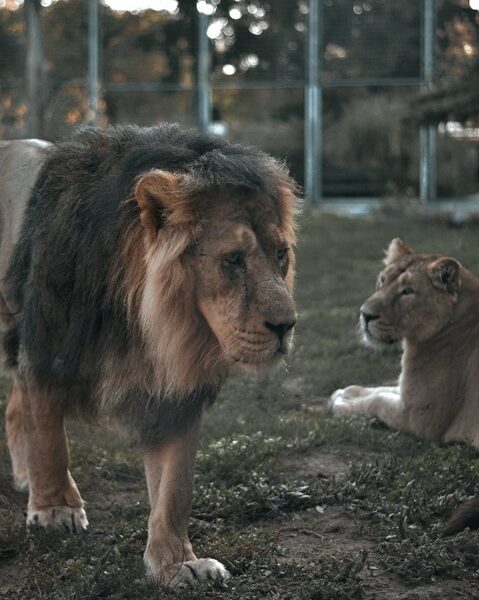
Ready to Make Your African Dream A Reality?
If hunting lion in Africa is on your list of big five game hunting safaris, hunting lions in Africa comes highly recommended. The hunt is exciting while making a significant contribution to the conservation of wildlife.
Are you ready to book your African big game hunt, or will it forever remain a dream?
Learn more about hunters’ personal experienced targeting this king of the jungle through a blog entitled ” My Lion Hunting Safari” or discover more about Africa’s Top 3 Lion Hunting Destinations.
Author: P.C. van Wyk
